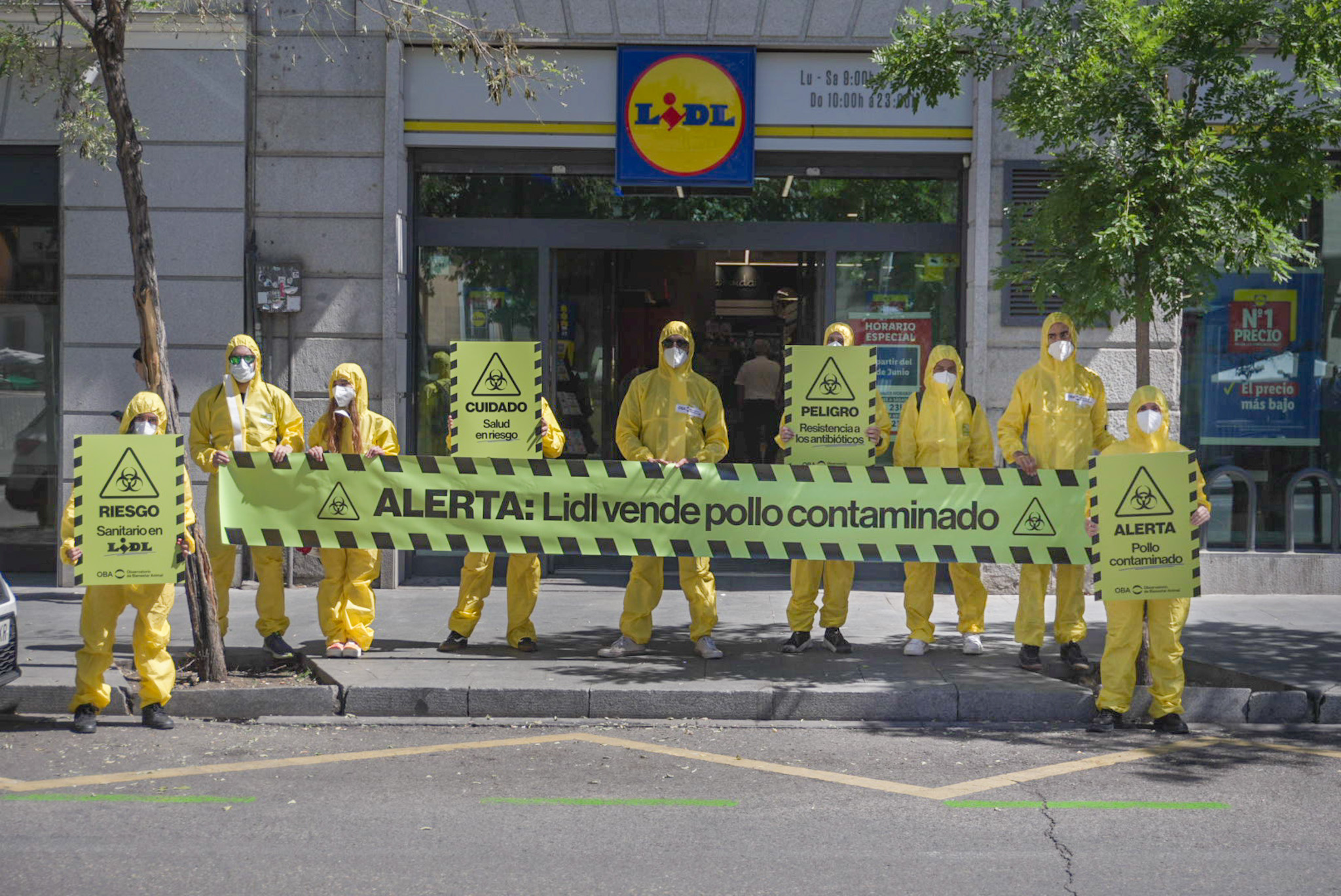Lidl supermarkets encourages the animal abuse and sell pollo con bacteria: Him Animal Welfare Observatory (OBA)announced this week a study warning of the presence of antibiotic-resistant bacteria in chicken samples from Lidl supermarkets in several European countries. 71% of samples in Spain are contaminated with bacteria resistant to antibiotics. 13 of the 24 containers of chicken were collected from two stores Lidl from the municipality of Alcorcón and 85% tested positive for antibiotic-resistant bacteria.
He Animal Welfare Observatory has protested in front of a branch of the chain in Madrid’s Tirso de Molina Square. The Minister of Health, Mónica García, addressed the issue with a message Lidl calling for a ‘collective effort’ in the fight against antibiotic resistance.
He Animal Welfare Observatory (OBA) This week revealed the results of a microbiological analysis carried out on 142 Lidl chicken trays in Spain, Germany, Italy, Great Britain and Poland. It was confirmed presence of bacteria resistant to antibiotics in 71% of Spanish samples. It also turned out that it contained 38% of the meat Listeria and 83% diarrheal pathogens such as Escherichia coli and Campylobacter. 13 of the 24 containers of chicken were collected from two stores Lidl of the municipality of Alcorcón. 85% tested positive for antibiotic-resistant bacteria.
A German laboratory independent, approved by the German accreditation body -DAkkS because of the abbreviation in German- and based in Cologne analyzed the main bacteria associated with foodborne infections in 142 private label products from 22 Lidl stores in Spain, Germany, Italy, Great Britain and Poland. The Spanish references are “split blunt chicken wings”, “chicken hams”, “chicken hindquarters”, “chicken carcass” and “chicken fillet” and were acquired in Madrid, Valencia and Barcelona. 17 out of 24 Spanish samples, 71% of the samples were contaminated, compared to a third of products in Germany or 58% in the UK. 13 of the 24 samples were collected from two stores Lidl of the municipality of Alcorcón, Madrid, located at Avenida las Retamas, number 16 and Avenida de Europa, number 22. These resistant germs can cause urinary tract infections, pneumonia or blood poisoning.
Lidl supermarkets sell chicken containing bacteria that are dangerous to health
Given these alarming results, said Julia Elizalde, Campaign Manager of Animal Welfare Observatory (OBA)states that “the only response from the largest European supermarket in terms of turnover was nothing other than denying the results of the report. Lidl still has no government policy that prevents the overpopulation of chickens and thus the overuse of antibiotics that end up in our refrigerators”. Of the Animal Welfare Observatory (OBA) They emphasize this in a context of permanent debate the treatment of animals on macro farms and its effects on public healthit is crucial that consumers are informed about the possible risks involved consumption of meat contaminated with bacteria and pathogens.

He Animal Welfare Observatory Last Saturday, June 22, a protest was held in Madrid in front of one of the branches of the German supermarket chain on Tirso de Molina Square in Madrid. Activists wore bright yellow biosafety suits to symbolize the public health risk of antibiotic resistance. Under the motto “Warning: Lidl sells contaminated chicken” Him Animal Welfare Observatory (OBA) demands that they be taken away Immediate action to end chicken overpopulation in your supply chaincalling on the supermarket chain to adhere to the European Chicken Commitment.
The World Health Organization has warned that if urgent action is not taken, the world is moving towards a post-antibiotic era in which common infections and minor injuries will once again become life-threatening. The WHO explains that antibiotic resistance occurs when bacteria mutate in response to the use of these drugs. These become resistant to antibiotics and can cause infections in humans and animals that are more difficult to treat than non-resistant infections. Therefore, antibiotic resistance increases healthcare costs, prolongs hospital stays and increases mortality. In an aging population like Spain, this problem mainly affects the elderly as a vulnerable group, but also pregnant women and children.
Lidl supermarkets encourage animal cruelty
He Animal Welfare Observatory (OBA) transferred the findings of the investigation to the Ministries of Consumer Affairs, Social Affairs and Agenda 2030 and the Ministry of Agriculture, Fisheries and Food, communicated the results of the investigation and requested that the microbiological presence of pathogens resistant to antibiotics and other pathogens with potential impact on public health in chicken meat from Lidl supermarkets and that a public report be released on the matter.
After the last Council of Ministers, the Minister of Health, Mónica García, spoke about the issue: “the problem of antibiotic-resistant bacteria is a global problem that has been addressed by the WHO and at European level.” It says that “Spain has reduced the use of antibiotics in animals by 68%, as this resistance is related to the use of antibiotics in animals and humans, and by 17% in humans.” At the same time, it has sent a clear message Lidl called for a collective effort and stated that the presence of these bacteria could cause serious public health problems.
According to Eduardo Costas, professor of genetics and expert in adaptation mechanisms of microorganisms to anthropogenic pollutants at the Complutense University of Madrid: “At first, resistance to antibiotics appears to be due to random mutations, often before exposure to the antibiotic. When we treat with antibiotics we select in favor of resistant bacteria that survive. Bacteria can transfer resistance genes to other bacteria through various molecular mechanisms. So there is no end to our war against bacteria: we are developing new antibiotics to which bacteria eventually become resistant. But the misuse of antibiotics quickly makes them ineffective. Resistant bacteria can reach us in many different ways, for example through direct consumption of contaminated products or through water from storage reservoirs where livestock wastewater ultimately ends up.”.
In a statement following the alarming results of the report: Lidl ensures that it shares the objectives of the organization European chicken commitment and they are already working on it. Elizalde adds: “we challenge Lidl to join the collective effort requested by the Minister of Health and make public their compliance with the directive European chicken commitment what they claim to be working on.”

